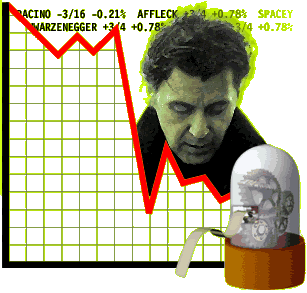
Hollywood has no shortage of penis-measuring contests by which its insecure, egomaniacal denizens try to triangulate their social positions in that completely carnivorous society. How close to the kitchen is your table at Spago's? When you board your private jet, do you have to crouch or is the door full-sized? But the mainstay of corporate self-esteem, the grande dame of totem-pole markers, is a movie's opening-weekend box office gross. Within minutes of the opening-weekend count, studio execs rise and fall, future projects get resurrected or put on permanent hold, and stars contemplate or reject new antidepressant regimens.
Opening-weekend box office fetishism is a recent phenomenon. Into the early '70s, studios didn't publish box office stats of any kind, so it's extremely difficult to know how much money, say, Casablanca, made. But now bean-counting has become a national sport, and the average 13-year-old probably can tell you that Adam Sandler's Waterboy grossed $39 million its opening weekend, or that Pokémon set a new five-day box office record for an animated feature.
We were all learning to measure films not by their intrinsic worth as art, or even as entertainment, but simply as market commodities that either "underperform" or "surpass performance expectations." Then, out of nowhere, NBC's entertainment newsmagazine Access Hollywood, hosted by the perhaps real, perhaps digitally inserted Nancy O'Dell and Pat O'Brien, came along and almost ruined it for everyone.
Seeds for the crisis were sown when Access Hollywood, which is usually little more than a chain of flatulent, uncritical promotional plugs for upcoming movies and "celebrities we love," decided to get a little edgy by adding a segment called "Battle @ the Box Office." (The "@" symbol as Internet signifier makes it clear that Access's benchmark for Internet chic is lost somewhere in 1995.) The spot featured Max Keiser, co-founder of the Hollywood Stock Exchange, a site where people obsessed with the entertainment industry buy and sell shares in movies, music, and celebrities, using fake-but-still-fun "Hollywood Dollars" provided by HSX. The site is such a booming success, boasting 350,000 registered users, that Access decided to let Keiser come on and predict which films would boom or bust over their opening weekends, based on predictions gleaned from his site.
In his November 5 TV debut, Keiser chose The Bone Collector as "the odds-on favorite to win," and then prophesied that The Insider would underperform because "reality bites" and, "America's tired of this movie-of-the-week stuff." He said little else, but it was already too much for Hollywood execs. News soon broke that studios, which provide Access Hollywood with its near-entirety of interviews, film footage, and sundry other goodies, might boycott the show if it didn't pull, or at least severely modify, Keiser's HSX segment.
The studios, it seemed, had serious problems with the idea that the audience might start playing their game of predicting opening-weekend grosses. In particular, they feared a self-fulfilling prophesy scenario: Person X hears that The Insider will only gross $8 million and, devastated by this low estimate, decides not to see the movie, even though this prediction is based entirely on market calculations and not on whether The Insider is a good film or not. As an additional conspiratorial flourish, studios also worried that rivals might go so far as to dump stock in one movie. For example, Warner Brothers could order all its employees to dump their shares in Disney/Miramax's The Talented Mr. Ripley, thereby lowering the "market value" of the film and, consequently, its opening-weekend box office projection numbers.
According to Max Keiser, this kind of collusive practice in a phony online stock market isn't just far-fetched and kind of pathetic, it's also impossible. "We've got the Hollywood Securities and Exchange Commission," Keiser assured GettingIt, "which tracks accounts, looks for any collusion, and levies fines when appropriate. At the end of the day it's a fairer environment than you'll find on any exchange in the world."
But Keiser also glimpses a broader problem: namely, that the Man (old-school media systems like the TV and film industries) is trying to suppress the Internet's free information flow, even while trying to ride the online wave by dot com-ing everyone to death. "People want to be involved in entertainment in a much more interactive way," says Keiser, "and I think that the studios may be underestimating the sophistication of the audience a bit. But before Blair Witch Project, they didn't really want to think about it ... [Blair Witch] changed the rules overnight, and now studios are facing reality."
Well, not quite. Hollywood is actually trying to pummel "reality" into servitude while figuring out how to co-opt it on its own terms. Clear evidence of Hollywood's new war on numbers came in Keiser's follow-up Access Hollywood segment on November 11, taped after studios had threatened to boycott the show. A kinder, gentler Keiser had nary a negative prediction to make. Instead, he concentrated entirely on movies and celebrities whose stocks were "on the rise," cryptically advising online traders to "buy Leelee Sobieski."
Evidently, Hollywood suits had to remind Access Hollywood of the show's prime directive as promotional prop for the entertainment industry (which means a steady stream of studio-approved hype), and that its only critical commentary had better remain Pat O'Brien's ad hominem, misogynist gibes at his babe co-host. But only time will tell how long Access can keep Keiser in line with its smiley-face parameters.
Peter Braunstein writes about film and pop culture for the Village Voice, and is currently co-editing an anthology on the 1960s counterculture.
Peter's column runs every other Wednesday on GettingIt.
